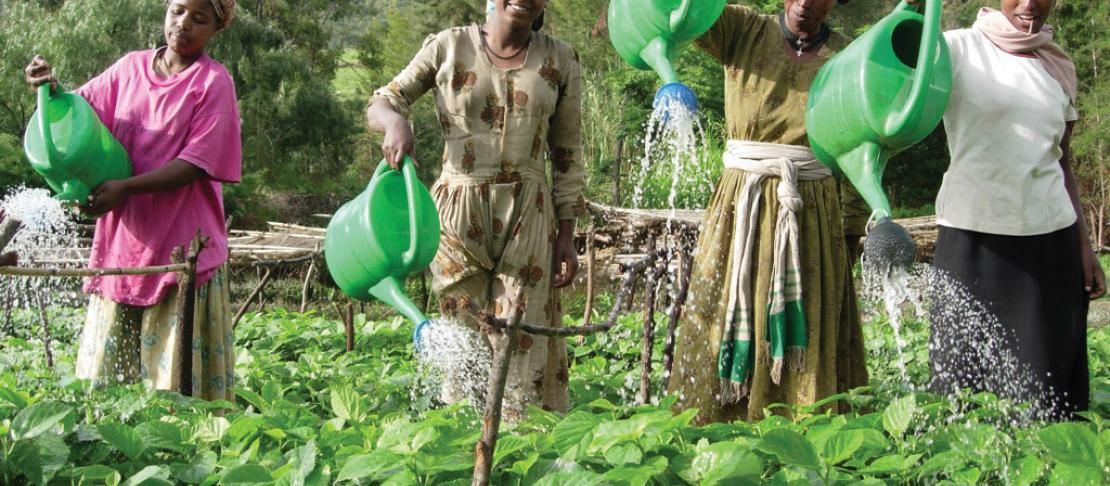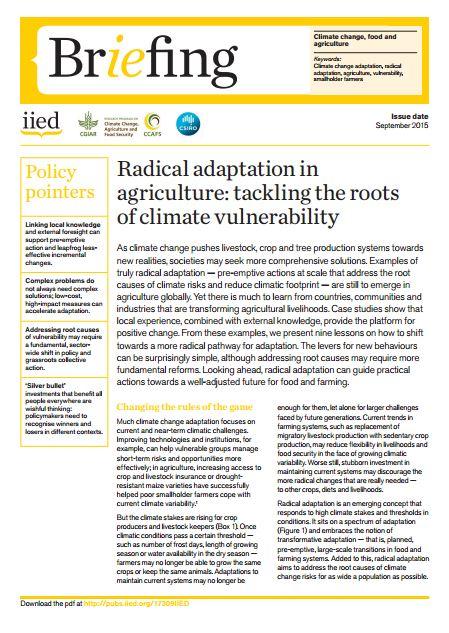A radical re-think of adaptation in agriculture

Local knowledge and community participation lead the way down radical adaptation pathways.
by Melanie Mason (CCAFS)

Case studies from around the world provide nine key lessons for better investments towards a radically adapted future agriculture:
- Adaptation programmes should strengthen local organisations rather than focus purely on technological innovation. Working together helps farmers overcome economic, social, technical and capacity barriers.
- It is important to draw on first-hand experience because farmers who already faced the challenges of climate change are likely to buy in readily to adaptation programmes.
- Leapfrog the learning curve: forecasting climate impacts and raising awareness can enable the first steps of adaptation to 'leapfrog' ahead of local experience.
- External knowledge can fine-tune local adaptation on introduce new options therefore it is important to share knowledge.
- Adaptation can benefit mitigation in ways that directly benefit farmers, therefore, adaptation interventions should maximise mitigation co-benefits where possible.
- Fundamental, sector-wide re-think of policy might be needed to address the root causes of climate change.
- Some of the case studies illustrate that strategies are needed to bridge the gap between initial investments and long-term benefits, making adaptation action more accessible to small scale farmers around the world.
- Rather than betting on a few large ‘silver bullet’ investments that seem to apply equally everywhere and to everyone, policymakers may need to spell out the trade-offs in different contexts.
- Effective development planning should assess different possible futures, such as considering whether the coffee industry has a viable role in the future national food security when making decisions on relating production areas for coffee in Central America.
These lessons are of particular importance for COP21. The conference brings together over 190 countries with the goal of keeping global warming under 2° C. These radical adaptation studies could serve as tools to contribute to the realization of the COP21 goals. Fundamental reforms and policy changes are suggested to support the realization of essential radical adaption activities which address the root causes of climate change.
During the recent Development & Climate Days, held alongside the UN Climate Talks in Paris, Dhanush Dinesh, Global Policy Engagement Manager of CCAFS presented the brief. He participated in the panel discussion on Radical Adaptation, where he highlighted a gradient of adaptation actions, starting with incremental, then systemic, then transformative, and finally radical. This is important to understand, as some successful adaptation strategies like improved seed varieties and agricultural insurance "will not work beyond certain thresholds," explained Dinesh.
Dinesh: First lesson for getting radical: combine indigenous knowledge w/ sci knowledge https://t.co/PTrpR51DfL #climatechange #DCDays
— CCAFS cgiarclimate (@cgiarclimate) 2015. december 5.
Download the brief:
Vermeulen SJ, Mason M, Dinesh S, Adolph B. 2015. Radical adaptation in agriculture: tackling the roots of climate vulnerability. London, UK: International Institute for Environment and Development (IIED).
Melanie Mason is a former Research Student Assistant at the CCAFS Coordinating Unit.
